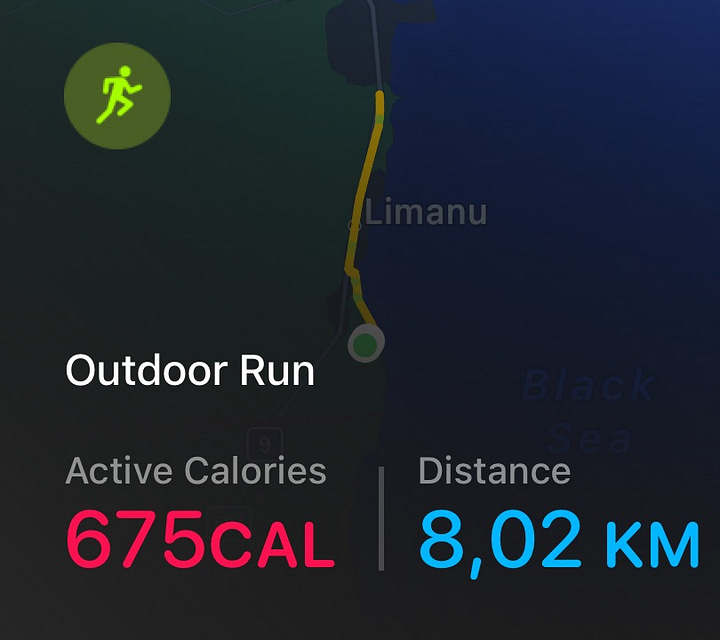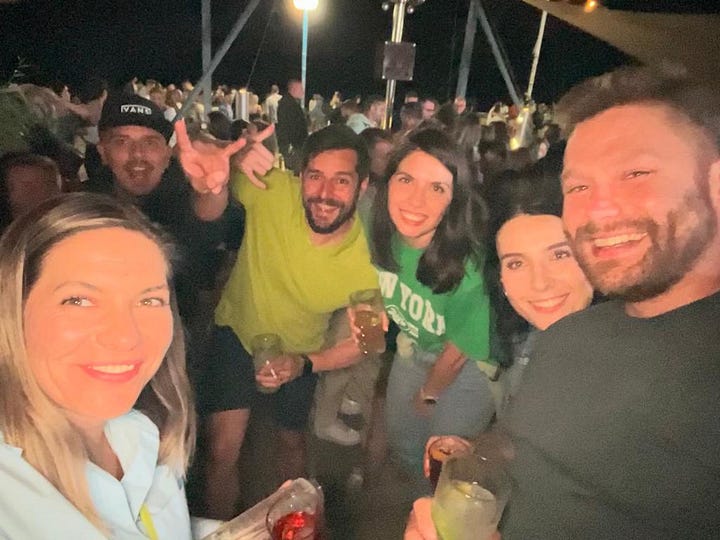#17: The power of your portfolio
How to leverage your experience by writing online or building things
Hey friends,
In this edition, I will talk about:
how I set my goal to run a half-marathon
the power of your portfolio
3 posts I liked
an app I recommend for running
an unpopular opinion about working under pressure


The longest run of the year and the first club selfie in ages
1/ Taking “running” seriously
My personal update for the week is that I try to take running more seriously. I’ve never run that much, I always thought it was very boring.
Until college, I played several sports: football (that’s soccer for my American friends), basketball, and volleyball. But I don’t believe I’ve run more than 2K.
From 18 to 27 or so, I didn’t do too much physical activity, and that can be seen when looking at photos from that period of my life. After that, I started going to the gym and discovered CrossFit about 5-6 years ago.
I don’t remember when I started running, but it was probably during the pandemic. It was sporadic, though, but for a few months now I’ve run almost every single Sunday.
But the turning point came last week. We spent a week at the seaside, and because working out was not very accessible (I did some resistance band training a couple of times), I ran every other morning.
And because this seems to get easier and easier, a couple of days ago I decided to prepare for my first half-marathon.
It’s not going to be very easy, for several reasons:
I’ve only run 10K once
I’m pretty heavy, which puts a lot of pressure on my knees
I don’t know if I will have the necessary time to prepare for it
Anyway, I started preparing, 5 running sessions a week, and my goal is to participate in the Bucharest race on October 15th.
I’ll let you know about my progress.
2/ The power of your portfolio
Not too many people understand the power of their portfolio.
A portfolio can mean many things:
a book
a software app
a social media account
We often say our knowledge is our best asset. And it really is.
But what is that knowledge without some practical applicability?
While I explained in the last edition why I feel a corporate job is the better option for most of us, I have to come up with a disclaimer here:
It would be best if you had side projects. Even if they are hobbies.
There are lots and lots of benefits to this, but I will talk only about one of them today: the advantage you get in an interview.
And this is especially true if you don’t have any experience or are trying to change your domain of activity.
I can ask you some theoretical questions and even ask you how you would do X or Y, but in the end, the people who will show me a project they worked on will be a lot more convincing.
Even if you tell me, “I helped develop this X system at work with these microservices and automatic deployment”. I don’t know if you are aware of it, but everything you develop for your job is your company’s Intellectual Property.
If we are more Catholic than the Pope, you shouldn’t even talk about what you’ve done, let alone show more details.
But, if you had your own web app, let’s say, we could just go through it during the interview. I could ask a few questions about how you did this and that, and we could have a conversation.
Will you have an advantage over someone who hasn’t implemented anything by themselves, even if that person knows the algorithms better?
Definitely?
Let me give you an example.
I have been hiring junior developers and interns for many years.
95% of them didn’t have any portfolios.
A few months ago, someone recommended me to a 16-year-old who wanted to do a summer internship.
Me and my colleague had a discussion with him, and he showed us an app that he built by himself, something quite complex, in Angular framework and using the OpenAI API. I won’t bore you with more technical details.
The point is, this guy, who is in high school, convinced us he is passionate and willing to work from start to finish in a project.
We hired him on the spot, and I’m convinced he is no short of a genius.
This is just an example in my field.
As I said before, your social media account can be your portfolio. Write or get featured in articles. Let me see your thoughts.
Ok, I understand your social media profile is private, it’s everyone’s choice about how they leverage their experience and free time.
But for me and probably many other people hiring, your Twitter, LinkedIn, or Medium profile might be a differentiator.
So, next time you read an interesting article or get an idea,
Build something based on it.
And share it with us.
3/ 3 Posts I liked
3 tweets or LinkedIn posts that made me think, educated me or amused me over the last week
This simple chart explaining arrogance
Some stats regarding people making money on ETSY (connected to what I wrote last week about solopreneurs)
The perfect product doesn’t ex…
4/ Recommended app: Nike Run Club
The first Nike app I used was Nike Fitness Club. It was at the beginning of the pandemic when the gyms were all closed, and I wanted to do some workouts at home.
I was very happy with the app; they have a lot of training programs and challenges, and that’s probably the main reason I didn’t get out of lockdown with 10 kg more.
After a while, when I started running, I discovered they also have a running app, and I tried it out as well.
This is even better!
And it’s the app I’ll be using to train for the half-marathon I was talking about above.
Why is it great? Mostly because they have these customizable training programs (for example, by the date you want to race), but especially because they have guided runs.
A lot of times you just need that extra push, and that’s where the coaches from the app can help you finish a workout.
And the best part is that it’s all free. I don’t even think they have a paid version.
So, for the half-marathon, I just told it that I wanted to race on October 15th, and it gave me a personalized plan to follow until then.
Not to mention the fact that the app gives you a lot of details regarding your run, like heart rate, stride length, and such.
But in all honesty, the new Apple Workout native app is probably better at this.
Anyway, if you want to give running a chance but don’t know where to start, download the app and get on one of their beginner's plans.
And just start running!
5/ My own favorite piece of content
This LinkedIn post is about why I believe we don’t actually work better under pressure, no matter what we say in our interviews.
Unpopular Opinion:
We Don't Work Better Under Pressure
In my current role at Deloitte as well as in my previous roles, I've had the privilege of witnessing the incredible dedication and talent of our teams firsthand.
Our ability to meet deadlines and deliver results efficiently is undoubtedly a key aspect of our success.
However, I believe it's essential to challenge the notion that working under constant pressure is the best way to achieve peak performance.
Parkinson's law reminds us that work expands to fill the time available for its completion.
Having well-defined deadlines does indeed encourage us to focus and accomplish tasks within a reasonable timeframe.
But let's take a moment to consider the long-term implications of consistently operating under stress.
Our well-being and mental health are priceless assets that form the foundation of our productivity and creativity.
When we subject ourselves to unrelenting pressure, it can lead to burnout, diminished job satisfaction, and reduced overall effectiveness.
As leaders, we must recognize that our success lies not only in meeting objectives but also in nurturing the well-being of our teams.
So, how can we strike a balance that fosters productivity while safeguarding our mental health? Here are a few suggestions:
1. Establish Realistic Deadlines
Setting realistic deadlines allows us to maintain focus without creating unnecessary stress. By engaging our teams in the process, we can collectively agree on timelines that challenge but do not overwhelm.
2. Encourage Open Communication
As leaders, we should promote a culture of open communication where team members feel comfortable expressing their concerns or seeking support when facing heavy workloads.
3. Prioritize Well-Being Initiatives
Incorporate well-being initiatives into our work culture. Encourage breaks, exercise, and self-care practices that support a healthy work-life balance.
4. Promote Time Management
Help our teams develop effective time management skills to optimize their workflow and ensure that they can deliver high-quality results without sacrificing their well-being.
5. Lead by Example
As executives, we play a vital role in shaping the company culture. By leading by example and showing that we value both productivity and mental well-being, we set the tone for the entire organization.
In conclusion, let's challenge the notion that constant pressure is the key to success.
Emphasizing a healthy balance between productivity and well-being will not only benefit our teams individually but also lead to more sustainable and enduring success.
Thank you for reading, and let me know if you liked something in particular in this newsletter.
Until next time,
Leo
P.S.: If you would like to read my content on a daily basis, don’t forget to follow me on Twitter and Linkedin.
P.S. 2: If you want to take your Productivity to the next level, check out my extensive Productivity course that can accelerate your career.






